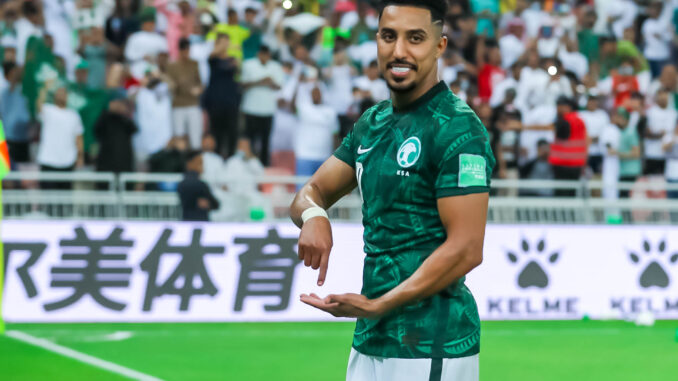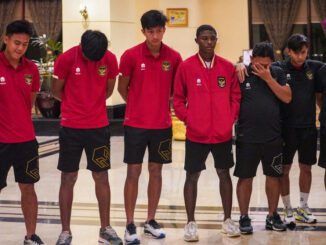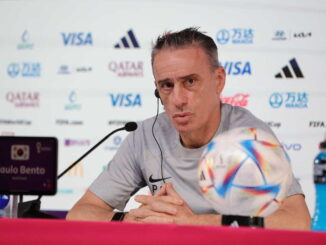
Saudi Arabia stamped their qualification for Qatar 2022 with a display against Australia at Jeddah’s King Abdullah Sports City Stadium that was the perfect encapsulation of modern Saudi football.
They were disciplined and aggressive. They attacked with intensity and with a freedom that allowed their natural talent and instincts to shine. As full time approached, and the party atmosphere inside the stadium began to reach fever, the Green Falcons were out there just having fun and showing a little razzle dazzle.
The scoreboard showed it was a 1-0 win, but it could and should have been so much more were it not for the heroics of Maty Ryan in Australia’s goal; the custodian, struggling for minutes at Spain’s Real Sociedad, producing two world class saves to deny Salem Al-Dawsari and Firas Al-Buraikan in a second-half blitz from the Saudis.
Leading the charge for the Saudis were the usual suspects – Al-Dawsari, Salman Al-Faraj and Yasser Al-Shahrani, as well as Mohamed Kanno, who has surely developed into one of Asia’s best central midfielders.
But, primarily because of where they play their club football, do we fully appreciate and value their talent and success?
What has been interesting in the discourse around the current state of the Socceroos has been the discussion about where Australia’s footballers are, or more to the point, aren’t playing their football.
Gone are the days of the so-called ‘Golden Generation’ playing at the very top of European football in England, Italy, Spain and Germany.
Instead, this current iteration of the Australian national team has a number of players playing domestically in Australia, a smattering across Asia and North America, and the rest in Europe in places like Turkey, Norway, Denmark, Scotland and Belgium.
This, in the eyes of many, is a key reason for the downturn in fortunes of the Socceroos, who are having to navigate the playoffs for the second successive qualifying campaign.
But that conveniently ignores the fact that Australia, with a team of players playing in various European leagues, were played off the park by a side comprised wholly from the Saudi Pro League; which suggests a deeper examination is required, not only of that flawed theory, but the perception and understanding of football globally.
Never has it been more evident that where you play doesn’t matter, and yet in so much of the discourse it apparently does, which speaks to the broader question of how value players and the leagues in which they play.
Making it in Europe has for so long been the measuring stick that we seem incapable of properly measuring and valuing talent that doesn’t follow that now well-trodden path.
But what does ‘making it’ even mean? Such a term is very subjective. Is it just playing in Europe at whatever level? Is it playing in one of the ‘Big Five’ leagues? Is it playing in Europe’s elite continental competitions? Is it winning silverware?
How would the perception of this Saudi Arabian side change were they to have a smattering of players across Europe in leagues like Belgium, Holland or France?
This was a theme Indian national team defender Sandesh Jhingan touched upon recently when talking to The Asian Game about his own brief experience in Croatia and his decision to return to India after only a few injury-ravaged months.
“I don’t want people (in) my country to only believe only if you go to Europe can you be considered as a great player,” the 28-year-old said.
“I don’t want people to have that, if Sandesh Jhingan or any other junior kid, if he wants to validate or prove himself that ‘I’m going to be a legend’, that he can only do it only if he plays for a bigger club in Europe. This is I don’t believe is the right way of looking at it.”
And yet it is so often the way it is looked at.
During the broadcast of the Socceroos’ clash against Saudi Arabia on Channel 10 in Australia, the commentators made repeated mentions of the fact that, despite their abundant talent, Saudi players had little to no experience in Europe. Intentional or not, it was a clear reference point for how their talent was to be valued and appreciated.
More mention was made of Al-Dawsari’s single La Liga appearance for Villarreal than the fact he led Al Hilal to an historic AFC Champions League success this past year – in fact, in two of the past three years – which speaks to how, not just here in Australia, but elsewhere, we value and respect football across the globe. It’s either Europe or it’s nothing. A single La Liga appearance is apparently worth more than two continental successes.
Make no mistake, Al-Dawsari, the 2021 AFC Champions League MVP, along with a handful of his Saudi teammates like Al-Faraj or Kanno, have the talent to play in Europe and it would be fantastic to see them do so. But their choice not to should not define them as players. It shouldn’t be “he’s a fantastic player, but…”
This theme was eloquently explored further by John Didulica, the respected former head of Australia’s player’s union and current Melbourne Victory director of football, in his excellent ‘Football Belongs’ series of essays for Optus Sport.
Referencing Australia’s cultural cringe, which can absolutely be extrapolated more broadly across Asia such is the reverence for European football across the continent, Didulica explored this theme by focusing on the career of one of Australia’s finest talents, South Melbourne’s Paul Trimboli, whose list of achievements is as long as any in the game in Australia.
“Assessed objectively, Trimboli’s on-field achievements would rank him among the greatest players the Australian game has seen, at least during the modern era,” Didulica wrote.
“In 2012, when the Johnny Warren Football Foundation conducted its Greatest Ever Australian Footballer fundraiser, its panel of experts augmented by a public voting nominated 58 players from which to choose a “greatest ever male player” (Kewell) and a “greatest ever first XI”.
“Trimboli was not among the nominees. Moreover, his omission would not have raised an eyebrow.
He continued: “Trimboli’s anonymity has as much to do with his understated humility as it does the layered framework through which success in Australian football is assessed. Like the cinema and literature before it, as football evolved into a fluid global enterprise, our perception of a player’s quality was judged against his success outside of Australian football; with local achievements depreciated. Trimboli never proactively sought out a career in Europe.
“Significantly, and unlike generations before him, this came a time when there was an expectation that our best and brightest would leave for Europe; the same way many of our finest writers would find their way to London a century ago.”
Getting to the heart of the matter, which applies equally to our appreciation of Asian footballers – such as Al-Dawsari – in a global context, Didulica wrote:
“Trimboli could not be admired by Australians for his quality alone; our perception of his quality needed to be contextualised against either a universal standard or by the perception of Australians that was being projected throughout the world; which in a football context is invariably appeasing Europe.
“As A.A Phillips outlined in defining cultural cringe, developing a universal standard for the assessment of the quality of Australian cultural outcomes, in this case Australian footballers, is a positive thing. And it is. There must, however, be limits to the extent to which we are deferential to a global standard and abrogate any sense of self-worth.”
Didulica could have easily been talking about a player like Al-Dawsari rather than Trimboli. The names may be different, but the theme is the same.
The fact is this: Al-Dawsari plays for Asia’s biggest club in Al Hilal, winning two of the past three AFC Champions League titles and was named MVP for the 2021 tournament. He’s been central to the renaissance of not only Al Hilal, which has seen them become one of Asia’s most dominant and feared clubs, but also the Saudi national team over the past five years, even scoring a dramatic 95th minute winner against Egypt at the last World Cup in Russia. Since then he has only got better.
And yet there is, and seemingly always will be a ‘but’.
That, however, says more about the person saying it than it does Al-Dawsari. He doesn’t need the external validation that would come from playing in Europe. He does his talking on the pitch.
And as we saw in Jeddah last week, and across this entire campaign, that talking says plenty.
Photo: twitter/SaudiNT




